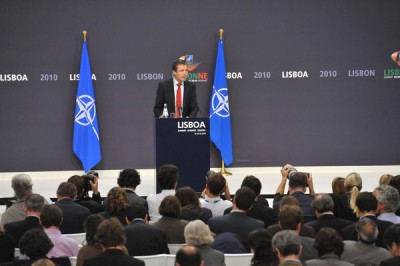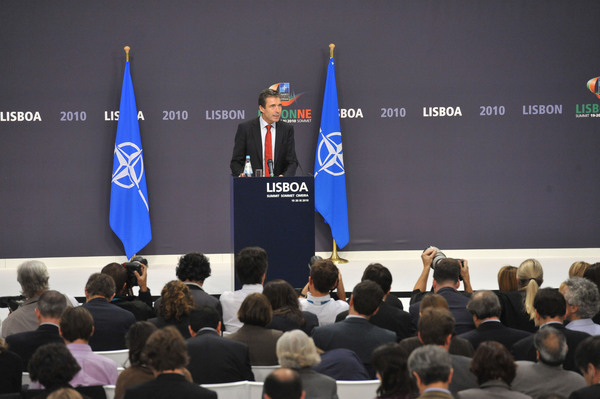What to remember from the NATO summit in Lisbon

1. A new strategic concept
It has the value of a “concept”. We all know that a concept is intended, above all, to identify functions and to bring together political consensus at a time "t", trying to provide a margin of flexibility to be able to react, or not react, to everything event. So it’s a bit like a Spanish inn (1). Its importance lies on two levels: recalling the fundamentals of the Alliance, defending a territory, and tracing new threats (such as cyber-attacks). This requires an adaptation of structures, which goes beyond an internal restructuring of the organization and obliges Member States to adapt their armed forces, therefore in times of budgetary crisis, to establish more cooperation between them, or even specialize (3).
2. The kick-off to structural reform
NATO has not adapted sufficiently to the new post-Cold War situation. As French President Nicolas Sarkozy sums it up: “ There will be an end to a form of mismanagement ". The number of agencies is reduced from 14 to 3. The staff is reduced by approximately 5.000 people (2). One command out of two is suppressed. Once these principles have been accepted, the real work begins now, as General Abrial explains (3). It is necessary to designate those who will disappear. Another pair of sleeves! It can however be noted that the overall balance is not modified. NATO remains an organization which escapes all control, and any obligation of transparency, including budgetary; it is accountable only to the governments that are members of it.
3. Exit from Afghanistan
Cautiously, we call this a transition phase, which will extend over four years between 2011 and the end of 2014, gradually passing the baton to the Afghan army and police. Canada and the Netherlands are setting an example in this area by having anticipated this change (4). But " the Alliance's commitment will last beyond that. clarified the Secretary General. The whole question will then be to know what is the importance of this residual commitment. In four years, the situation may have changed. No one dares to utter the word "failure". But all the same, we can ask ourselves this question. Why did it take almost ten years to move from a strategy of combat, of expulsion of the Taliban and filling (not to say occupation) of the territory, to a more realistic and democratic strategy of helping the Afghan state to acquire greater resources. It may be noted in passing that in this operation of the allies which is taking place, all the same, under a UN mandate, the United Nations had nothing to say nor were they consulted.
4. The Anti-Missile Shield
This is a real project for the Alliance. It is based on two separate projects. One carried out in 1999, under cover of the Alliance, had the sole objective of covering the deployed forces. The other, envisaged by the United States under the Bush administration, aimed to complete the American architecture by providing certain European countries (Czech Republic and Poland) with radar and anti-missile means allowing early warning. This tool had two disadvantages: it did not perfectly cover the European zone. It was objectively more focused on Russia than other threats. The project approved on Saturday has another flavor. Under the cover of the Alliance, aiming to protect all European territories from an anti-missile threat, it is a “modernized” return to territorial defense. Instead of tanks, they are anti-missile batteries. And Russia is no longer the enemy but the ally. There will therefore not be a single shield. More like two. Each mastering their area, and their technology, and being able to press their button. But there will be exchanges of information, or even more. “Hedging” exchanges.
5. NATO no longer has an enemy
In the same way that Russia is no longer an enemy (see below), this shield does not designate an enemy. A decision, taken under Turkish pressure. If Iran is on everyone's minds today, in two years, in ten years who will be the enemy? Pakistan or India could well be on the list, or even China. It is therefore wise not to nominate anyone. To imperatively designate Iran as the enemy, as President Sarkozy did, seated warmly at the back of a press room where the Portuguese deminers had passed a few minutes before may seem imprudent.
6. Reconciliation with Russia
We are not going back to the point of 2008. We are not trying to tinker in a NATO-Russia Council. We are not in the lyrical impulses of the Gorbachev era either. We are a bit in between, looking for political and above all concrete cooperation, to form a bit of a bloc against the rest of the world. Everything is not yet very precise. But the various projects approved in Lisbon (transition/withdrawal in Afghanistan, anti-missile shield, etc.) are concerned.
7. Relations with the European Union
NATO's attitude remains ambivalent. And at the end of this summit, a European can only be bitter. Despite some appearances, the Alliance remains dominated by its main contributor, the United States, and the United Kingdom is using NATO as a famous strike to crush defense Europe. Thus the new strategic concept recognizes the EU as a "single partner", almost essential, seeking with it a "partnership" that can be considered more balanced (5). But it also affirms its desire to develop new tools, such as the civil-military tool, which in fact duplicate the tools of the PeSDC, and amounts to emptying this partnership of its main interest (6). Which is perfectly reflected in the words of Nicolas Sarkozy: the place of European defense is... in NATO! (7).
(Nicolas Gros-Verheyde)
Read also:
- Text: the new strategic concept
- NATO. Objective: to degrease the mammoth…
- Gen. Abrial: “A lighter, more efficient alliance”. The “real” debate begins
- The countdown has begun for troops in Afghanistan
- NATO recognizes the EU and invites it to collaborate more closely
- (6) Upcoming article
- The place of Defense Europe, for Sarkozy, is… in NATO?
